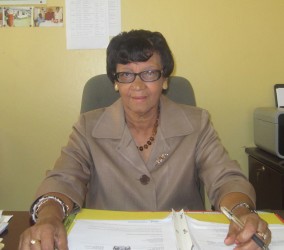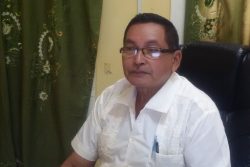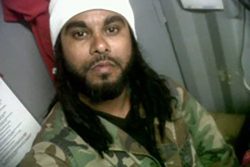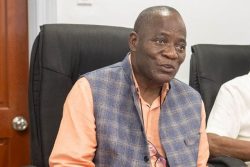Medal of Service awardee Patricia David is humbled and thrilled that her 50 years in education have resulted in national recognition and she is hopeful that it will inspire teachers of today.
David, 70, the present Executive Director of the Adult Education Association of Guyana Inc (AEA), was listed when awardees were announced on Independence Day last month.
David has taught at all levels of the education system since becoming a pupil teacher in 1961 at the age of 16.

After gaining her trained teacher’s certificate in 1968 with a concentration in Home Economics, she moved on to the University of Guyana, where she trained in Education. Her graduation in 1980 did not mark the end of her learning has she has continued to train in her field. As recently as last month, she underwent training as part of a USAID project.
This consistent interest in education has seen her serve in numerous capacities over her long career, including instructor at the Carnegie School of Home Economics and Lecturer at the Cyril Potter College of Education.
After her retirement in 1998, she has served and continues to serve as a member and executive member of several education supervisory bodies both in Guyana and the region. These include: the Association of Caribbean Tertiary Institute (ACTI) Guyana chapter; the Caribbean Association of Tertiary Institutes; the National Commission for UNESCO; the Kuru Co-operative College Board; the Carnegie School of Home Economics; and the Craft Production and Design Division.
David believes that her greatest professional achievement is her continued service after 50 years. “I am still in education. After 50 years in education, I am happy that I can still serve,” she said.
Changes in teaching
Asked to describe how the provision of education has changed over that period, David identified the increase in resources, which, strangely, has appeared to result in a decrease in the quality of students produced. “We didn’t have computers and the internet and all of that yet [and] I think we produced quality students,” she said.
Teachers, she said, “need to be more committed and spend a little more time with their students.” She stressed that when she started in education, “We taught everything, we made sure we taught before we evaluated. We made sure the students understood the concepts. We knew nothing about extra lessons, weaker students were tutored during lunch and after school. Even travelling everyday as a pupil teacher I never left school until I was sure students understood the day’s lesson.”
As head of a second chance institution dealing with dropouts, David said she has realised that not enough attention is being paid to many of those who have dropped out because she finds they often do quite well when they get to the AEA.
She acknowledged that many teachers are working at a disadvantage in overcrowded classrooms, especially at the primary level. She also bemoaned the fact that many teachers are not trained to identify and address learning deficiencies.
“In some cases some children have learning disabilities and not all teachers are trained to deal with them so you find that children went through a system not suited for them and so they became frustrated and drop out. When they come here [AEA] as teenagers, you realise that they could’ve done better if it was only observed that they had learning disabilities,” she noted.
One other glaring difference David finds is the proliferation of social problems. “We didn’t have as many social problems either,” she said, “although people were poor, families laid a lot of emphasis on education. No matter how poor they were, parents saw to it that their children had a basic education.”
She hopes that efforts are soon made to strengthen early childhood education. “Children must leave primary fully literate, able to read and write well so primary schools need to be strengthened. Primary schools must be very strong,” she emphasised.
This, she pointed out, can be achieved through better teacher training and smaller class sizes so that teachers who are now working at a disadvantage can have a greater impact. There is also a need for newer teachers to be able to work with experienced teachers as their assistants to learn from their experience, she said.
Helping boys see value of education
David’s years of service have been marked by no true regrets but with the experience she has gained, she now wishes that she had paid more attention to male learners.
“Throughout my career I paid more attention to the girls but I now know we need to pay more attention to boys, we have to show boys the importance of education. It’s the only way to fight the get-rich-quick syndrome which often leads them to crime. As educators we have to pay more attention to boys so that we can help to shape characters who understand that they are no less a man if certain things happen to them. You notice all these murders, with men killing their spouses, this is because we have failed to teach them how to constructively handle failure or how to compromise. They believe that as men they should always dominate and be in control. We need to let them know that compromising makes them more of, not less of, a man. Failures sometimes happen, you must learn how to use it as a challenge and move on,” she said.
David hopes that her national honour can be used to help others in the system understand that efforts in education must never be halfhearted. “Make sure that you maintain good relationships, not only with your students but also with members of staff and parents. You will never be successful without good relationships and you have to demand respect, not in a domineering way but by making persons understand that functional superiority is important. Remember, education is a process and every day you are learning, how you conduct yourself transfers your values to your students and through them to the society,” she advised.
“To be successful in education you must understand individual differences; not everyone is alike, and children are from different cultures and must be taught to respect each other. Children must understand each other’s culture. You, as an educator, must deal with different personalities well, in order to avoid chaos,” she added.
David was previously awarded for Long and Meritorious Service by the Ministry of Education and for being an Outstanding Women’s Leader by the YWCA.
The Adult Education Association of Guyana Inc had previously been awarded with a Medal of Service.








